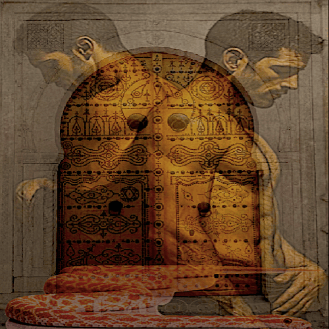Indie song lyric project Cajun Dead et Le Talkin' Stick Are Redefining Acadian Music in Real-Time
Cajun Dead et Le Talkin' Stick music project reshaping narrative of Acadian music with raw social issues faced by today’s Acadian communities.

Acadian music has a long, celebrated history, community, and joy. The kitchen party has epitomized this spirit, where fiddles, accordions, and clinking glasses unite people in triumphant harmony. But in the shadows of this rich tradition, a new wave is rising—one that refuses to sing only about the past or the good times. Enter Cajun Dead et Le Talkin' Stick, a music project reshaping the narrative of Acadian music by diving headfirst into the raw social issues faced by today’s Acadian communities.
At a time when many in the Acadian music scene are focused on the Grou Tyme celebration, this group stands out by using their art as a platform for storytelling, activism, and change.

Challenging the Mainstream Narrative at CMA 2024
The Congrès Mondial Acadien 2024 (CMA 2024) promised to be a significant cultural event where the Acadian heritage is proudly displayed. For most artists and participants, it's about joy, community, and continuing the legacy of the proud Acadian tradition. However, Cajun Dead et Le Talkin' Stick find themselves walking a different path—one that critiques this very narrative of celebration, particularly how it glosses over the real struggles many Acadians face in rural areas.

The song lyric project of Cajun Dead et Le Talkin' Stick isn't just another nostalgic trip down memory lane; it’s a direct response to the current, often uncomfortable realities that are overlooked in mainstream Acadian discourse and need to be addressed if the culture wishes to move forward. The project is not getting the same love or spotlight from the Heritage Patrimonial Industry Oligarchs, who promote the happy kitchen party template that defines much of the traditional Acadian music scene. Yet this is where Cajun Dead shines—by telling stories that matter right now to the marginalized with no voice.
The ever-growing song catalogue delves into modern-day Acadian struggles, tackling heavy subjects like homelessness, alienation, and the fractured nature of rural communities. With lyrics that paint a vivid, sometimes unsettling picture of life in these places, they force listeners to confront the darker undercurrents of Acadian life, making their work much more than just music—it’s a form of social commentary.

From Homesickness to Homelessness: A New Acadian Narrative
One of the most powerful tracks from Cajun Dead et Le Talkin' Stick is “Call Nous Back Home,” but this isn’t your typical homesick ballad. It’s a narrative that hits closer to home for those grappling with much bigger issues. Instead of the usual wistful longing for one's hometown, the song tells the story of someone sleeping outside because they don’t have a home to return to. It’s a stark portrayal of homelessness, a growing issue in rural Acadian areas.

The song speaks to a more contemporary, raw expression of what it means to belong. Lines like “human flow” and “homeless to others” force listeners to rethink the romanticized notion of the Acadian community as a close-knit family. Instead, it asks listeners to consider the marginalized, those who may live in the same towns but exist on the fringes, disconnected and invisible.
This poignant imagery reflects the human condition and reminds us that home is not just a physical space. For many Acadians, particularly those struggling with poverty and isolation, the concept of belonging is increasingly elusive. Through their music, Cajun Dead et Le Talkin' Stick shine a light on these untold stories, making them impossible to ignore.
Outsiders and Insiders: The Line Between Us and Them
Not all Cajun Dead et Le Talkin' Stick's lyrics are heavy and sad. Their song “A Boat in the Bay” offers a more nuanced take on the concept of outsiders and insiders. The line “it’s not one of our own” encapsulates the tension between the local Acadian communities and the outsiders who visit or move into these areas. It’s a commentary on how some Acadians feel displaced in their homes, even as they try to preserve their cultural identity.

The song deftly weaves between themes of belonging, identity, and alienation, offering listeners a moment of reflection on their position in the world. It forces us to ask: Who gets to belong, and who is left outside looking in? The vivid imagery of this song stays with you long after the music fades, turning a simple lyric into a broader conversation about the nature of community and acceptance.
This exploration of outsiders versus insiders is a recurring theme in Cajun Dead et Le Talkin' Stick’s work. They challenge the Acadian community to look beyond the surface of unity and recognize the existing fractures, both within and without. Their ability to paint these complex dynamics in song sets them apart in the Acadian music scene.
Leveraging Social Media to Tell Their Story
One of the key elements of Cajun Dead et Le Talkin' Stick’s success is its innovative use of social media. While many Acadian musicians rely on traditional promotion methods through festivals like CMA 2024, Cajun Dead et Le Talkin' Stick has fully embraced the digital age with IG reels and short snippets on open-source platforms. The project isn't just about music—it’s about creating a conversation, and platforms like Instagram and YouTube reels have become their main venues for engaging with their audience.
Their social media presence is more than just promotional; it’s a hub for discussion. They post not just music but also behind-the-scenes insights into the struggles of rural Acadian communities, the songwriting process, and the real-life inspirations behind their lyrics. Fans engage directly, not just with the music but with the themes and issues raised in the songs. This two-way dialogue has turned their project into a movement, drawing attention from fans who might not traditionally listen to Acadian music but are attracted to the social messages embedded in their work.
This approach has helped Cajun Dead et Le Talkin' Stick carve out a unique niche in the Acadian music scene. They are self-representing artists—Artiste de la Baie—who create content not for Heritage Patrimonial industry approval but for the communities they represent. Through contemporary art, design, sound, and vision, they are fostering a new understanding of Acadian identity, which embraces modern life's complexities and struggles.

Cajun Dead et Le Talkin' Stick redefines what it means to be an Acadian artist in 2024. Their acadian song lyric catalogue is unlike anything in Acadian music culture today. It isn't just a reflection of their cultural heritage—it’s a call to action, a conversation starter, and, most importantly, a voice for those who have long been ignored and ghosted. As the Song Lyric project continues to push the boundaries of Acadian music, they are reshaping the sound and soul of this proud and resilient community. If you're ready to see Acadian music evolve in real-time, keep your eyes—and ears—on Cajun Dead et Le Talkin' Stick.

You'll be hearing from me, baby, long after I'm gone
I'll speak to you sweetly from a window in the Tower of Song.
FAQ:
What is Cajun Dead et Le Talkin' Stick's main focus in their music?
Cajun Dead et Le Talkin' Stick uses French Canadian song lyrics to address contemporary cultural issues. Their music goes beyond mainstream Acadian themes to explore real-life struggles and experiences in rural Acadian communities.
How does Cajun Dead et Le Talkin' Stick differentiate itself from other Acadian music projects?
Unlike traditional Acadian music that often centers on pride and celebration, Cajun Dead et Le Talkin' Stick uses music as a platform for storytelling and activism, addressing raw social issues such as homelessness and alienation within the Acadian community.
Who is Cajun Dead et Le Talkin' Stick's target audience?
Their music appeals to those interested in French Canadian song lyrics and contemporary cultural reflections, particularly those who appreciate a world music approach to the Acadian song catalogue.
What themes are prominent in Cajun Dead et Le Talkin' Stick's songs?
Their songs tackle themes like belonging, identity, and the socio-economic struggles in rural communities. Challenging traditional narratives encourages reflection on issues often overlooked in mainstream Acadian music.
How has Cajun Dead et Le Talkin' Stick utilized social media to reach their audience?
They leverage platforms like Instagram and YouTube to engage in direct conversations with fans, sharing music and the real-life stories and inspirations behind their lyrics. This approach creates a movement and draws audiences interested in their social messages.
In what way do they redefine Acadian music?
Cajun Dead et Le Talkin' Stick is redefining Acadian music by embracing modern life's complexities and using its platform to voice the marginalized. Their innovative blend of music and social commentary offers a fresh perspective on what it means to be an Acadian artist today.
Why does their work resonate globally?
By integrating world music elements and addressing universal themes of identity and belonging, their music transcends geographic boundaries, appealing to a diverse audience interested in cultural and social narratives.
What is the mission behind Cajun Dead et Le Talkin' Stick's music project?
The project aims to reshape the narrative of Acadian music by addressing pressing social issues that today’s Acadian communities face, going beyond traditional themes, including storytelling and activism.
How does Cajun Dead et Le Talkin' Stick stand out in the Acadian music scene?
By focusing on raw social issues such as homelessness and alienation, they move away from mainstream celebration-focused Acadian music, using their platform for meaningful storytelling and change.
What kind of audience is the Cajun Dead et Le Talkin' Stick music project targeting?
Their work appeals to those interested in French Acadian culture and contemporary art enthusiasts looking for music that pushes creative boundaries and addresses social themes.
Which themes do Cajun Dead and Le Talkin' Stick explore in their songs?
Themes of belonging, identity, and socio-economic struggles in rural communities are prevalent in their music, challenging traditional narratives and inspiring reflection within their audience.
How does Cajun Dead et Le Talkin' Stick engage with their audience?
They leverage social media platforms like Instagram and YouTube to share music and the real-life stories behind their lyrics, creating direct conversations and engaging fans with their social activism.
How is Cajun Dead et Le Talkin' Stick redefining Acadian music?
Their innovative blend of music and social commentary offers a fresh perspective on Acadian art, embracing modern challenges while providing a voice for marginalized communities.
Why does Cajun Dead et Le Talkin' Stick's music resonate globally?
By integrating world music elements and universal themes of identity and belonging, their work transcends geographic boundaries and appeals to diverse audiences interested in cultural narratives.

